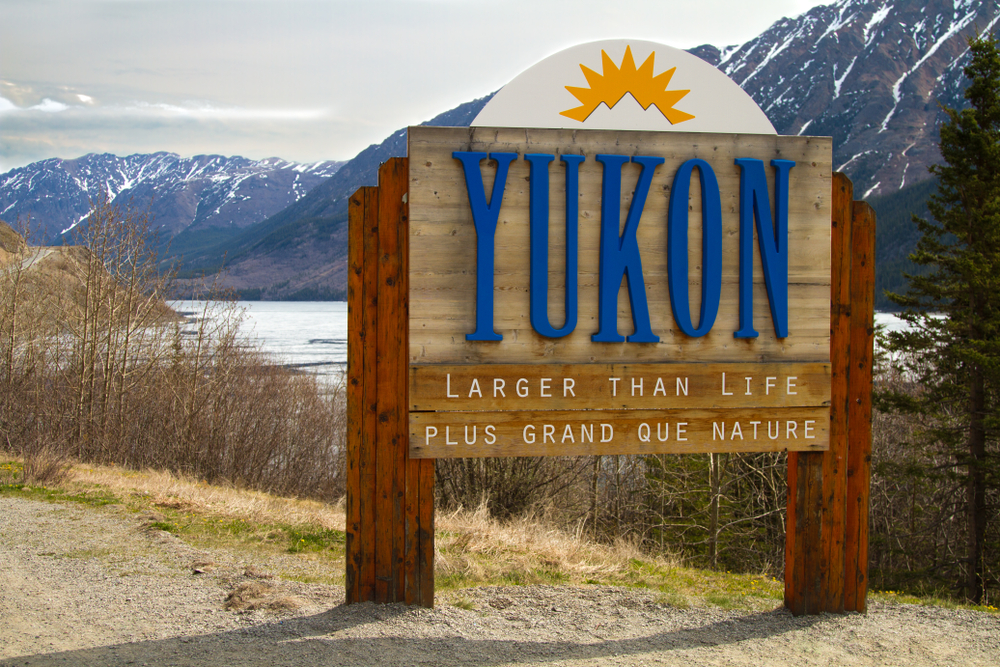How Canada’s North is Trying to Grow Local Food Production
In Yukon, gardening and farming take a bit more effort and often a helping hand.
How Canada’s North is Trying to Grow Local Food Production
In Yukon, gardening and farming take a bit more effort and often a helping hand.

Community gardens are popping up across the Canadian territory of Yukon.by A. Michael Brown/Shutterstock
It’s harder to grow crops in Canada’s northern territories, sure. Harder, but not impossible. North of the 60th parallel, things just require a bit more work. Some experimentation, research and often community.
Across the territory of Yukon, community gardens and co-ops are popping up. The farmers’ market in Whitehorse has welcomed new producers, with booths selling cheeses and locally butchered meats. Breweries and cider houses are opening and farmers are able to put together CSA boxes of produce.
Not bad for a region where less than 5 percent of food is grown locally.
But that’s a statistic that local growers and government officials want to change. There are federal and territorial funding grants available for everything from large-scale farms to community greenhouses, all designed to help out local producers. For many across Yukon, growing food is more than a hobby or a career. It’s about food sovereignty.
“The pandemic showed how supply chains (can be) disrupted. I think the more that we can do to ensure sustainability in the North, the better,” says Deborah Turner-Davis, a board member of the Whistle Bend Community Garden (WBCG) in a northern suburb of Whitehorse. Turner-Davis notes that there are only a handful of highways into the Yukon. If there’s a washout, bad weather or disruptions from COVID-19, food scarcity becomes a big problem, very quickly. “We’re relying entirely on this one silver ribbon. If anything impedes the flow of goods, there’s a rush on food and it’s very difficult to get things,” says Turner-Davis.
That’s why Turner-Davis has seen membership at the WBCG increase in recent years. As the area’s population is growing, the community garden is serving as a reliable gathering point, with close to two acres of land to work on. Two years ago, the garden applied for funding and Turner-Davis says they have applied for a federal grant this year to help with their rapid expansion. The garden needs basic supplies and help with irrigation and water supply as their membership grows.

“One of the original, earlier board members is across the street from the community garden and a water source, at the moment, is to string the hoses across the street to his exterior tap and fill up our huge holding tank…,” says Turner-Davis. “So we keep blowing through hoses.”
On a bigger scale, funding can be used for staff wages and production, like at the Tr’ondëk Hwëch’in Farm (TH Farm) just outside of Dawson City. The teaching farm is one of the only First Nations working farms in the region and is trying to fill some of the need for local food. “(With our production) we have that ability to be able to serve hundreds of families over a 10 week period,” says farm manager Derrick Hastings. “If we can start with two and a half months, and get it to three and a half months, and then we’re building some infrastructure to serve clients over the course of the year, more consistently.”
That’s where the community aspect comes into play again. Hasting says that with a much shorter and much colder growing season, TH Farm relies on gardening tips and tricks that they pick up from other gardeners and share. But rather than stick with root vegetables and cold-weather crops, producers such as TH Farm are forging ahead, trying to figure out what works. Their vegetable boxes include onions, carrots, radishes, tomatoes, cucumbers—all crops that you’d find in your CSA share in warmer climates. But at TH Farm, crops like tomatoes stay in a greenhouse all year round. Hastings says he once saw frost as late as mid-June, popping up again as early as mid-August. They don’t take any chances.
What TH Farm does accept are resources and advice. Just north of Whitehorse is a small research forest and demonstration farm. Bradley Barton, a research technician for Yukon Agriculture Branch, says the spot allows officials to test out crops, experiment with growing techniques and ultimately pass what they’ve learned along to local producers to expand the farming and gardening community.
Recently, Barton and his team have experimented with growing grains, figuring out the tweaks needed to make the prairie crop thrive up north. They’ve learned to adjust fertilizer and water levels and to plant as early in the season as possible. “You don’t have room for error,” Barton says, noting that farmers further south have the luxury of waiting a week or two if the weather isn’t on their side. Not so up north. “You need to get out there and take every piece of time that you have heat and the seeds will germinate and grow. You want to use all of it and you need all of it,” says Barton.
It’s by embracing this community mindset that gardeners and producers have been able to make strides in the region. Sharing resources and tips, and allocating funding widely, has allowed food production to blossom across the Yukon over the last few years. “Community gardens allow people to democratize that process and manage some of their own food needs. And I think that’s just important generally, for people’s sense of well being,” Turner-Davis says. In a region where food sovereignty is a key issue, a big part of the solution may just revolve around collaboration.
Follow us
This work is licensed under a Creative Commons Attribution-NoDerivatives 4.0 International License.
Want to republish a Modern Farmer story?
We are happy for Modern Farmer stories to be shared, and encourage you to republish our articles for your audience. When doing so, we ask that you follow these guidelines:
Please credit us and our writers
For the author byline, please use “Author Name, Modern Farmer.” At the top of our stories, if on the web, please include this text and link: “This story was originally published by Modern Farmer.”
Please make sure to include a link back to either our home page or the article URL.
At the bottom of the story, please include the following text:
“Modern Farmer is a nonprofit initiative dedicated to raising awareness and catalyzing action at the intersection of food, agriculture, and society. Read more at <link>Modern Farmer</link>.”
Use our widget
We’d like to be able to track our stories, so we ask that if you republish our content, you do so using our widget (located on the left hand side of the article). The HTML code has a built-in tracker that tells us the data and domain where the story was published, as well as view counts.
Check the image requirements
It’s your responsibility to confirm you're licensed to republish images in our articles. Some images, such as those from commercial providers, don't allow their images to be republished without permission or payment. Copyright terms are generally listed in the image caption and attribution. You are welcome to omit our images or substitute with your own. Charts and interactive graphics follow the same rules.
Don’t change too much. Or, ask us first.
Articles must be republished in their entirety. It’s okay to change references to time (“today” to “yesterday”) or location (“Iowa City, IA” to “here”). But please keep everything else the same.
If you feel strongly that a more material edit needs to be made, get in touch with us at [email protected]. We’re happy to discuss it with the original author, but we must have prior approval for changes before publication.
Special cases
Extracts. You may run the first few lines or paragraphs of the article and then say: “Read the full article at Modern Farmer” with a link back to the original article.
Quotes. You may quote authors provided you include a link back to the article URL.
Translations. These require writer approval. To inquire about translation of a Modern Farmer article, contact us at [email protected]
Signed consent / copyright release forms. These are not required, provided you are following these guidelines.
Print. Articles can be republished in print under these same rules, with the exception that you do not need to include the links.
Tag us
When sharing the story on social media, please tag us using the following: - Twitter (@ModFarm) - Facebook (@ModernFarmerMedia) - Instagram (@modfarm)
Use our content respectfully
Modern Farmer is a nonprofit and as such we share our content for free and in good faith in order to reach new audiences. Respectfully,
No selling ads against our stories. It’s okay to put our stories on pages with ads.
Don’t republish our material wholesale, or automatically; you need to select stories to be republished individually.
You have no rights to sell, license, syndicate, or otherwise represent yourself as the authorized owner of our material to any third parties. This means that you cannot actively publish or submit our work for syndication to third party platforms or apps like Apple News or Google News. We understand that publishers cannot fully control when certain third parties automatically summarize or crawl content from publishers’ own sites.
Keep in touch
We want to hear from you if you love Modern Farmer content, have a collaboration idea, or anything else to share. As a nonprofit outlet, we work in service of our community and are always open to comments, feedback, and ideas. Contact us at [email protected].by Emily Baron Cadloff, Modern Farmer
June 26, 2021
Modern Farmer Weekly
Solutions Hub
Innovations, ideas and inspiration. Actionable solutions for a resilient food system.
ExploreExplore other topics
Share With Us
We want to hear from Modern Farmer readers who have thoughtful commentary, actionable solutions, or helpful ideas to share.
SubmitNecessary cookies are absolutely essential for the website to function properly. This category only includes cookies that ensures basic functionalities and security features of the website. These cookies do not store any personal information.
Any cookies that may not be particularly necessary for the website to function and are used specifically to collect user personal data via analytics, ads, other embedded contents are termed as non-necessary cookies.
This is an good article and an exciting area of growth. Would love to hear updates in the future or have ways to help donate/support them. They need hoses? I have 20 bucks for that. Give me a link.
Nothing makes me more excited that seeing communities grow and support each other’s agricultural development.